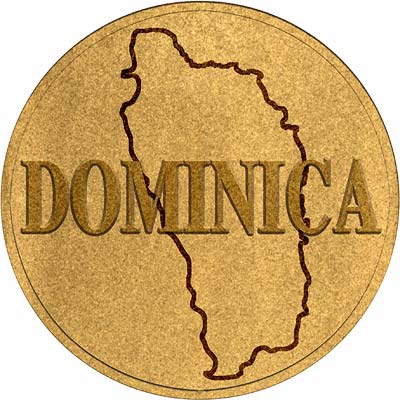| The Very Highest Quality Information... |
| Dominican Coins |
|
| ||||||||||||||||||||||||||||||||||||
 | ||||||||||||||||||||||||||||||||||||
Pre-Colonial History
As is the case with many Caribbean islands, the initial inhabitants of Dominica were Arawak Amerindians, who were later displaced by the more aggressive and warlike Caribs, who arrived in around the 14th Century. The island got its name (Dominica, not to be confused with the Dominican Republic) because it was first spotted by Christopher Columbus on a Sunday (or ''Doménica' in Italian).
French Colonisation
The first Europeans to colonise the Island were the French. The island was claimed for France in 1635, but was initially unsettled following a 1660 agreement between France and the newly restored (with French backing) Charles II of England, which specified that the island was to be left unsettled and unoccupied as a buffer zone between French and English territories in the Caribbean.
In 1715 however, defeated rebel settlers from nearby Martinique fled to the island and established settlements in the southern portion of the island. 12 years later, in 1727, the French crown introduced a government there to preside over their wayward subjects and their young descendants. Dominica thus became a formal French olony.
British Colonisation
Dominica did not remain a French colony for very long however, as it was captured by the British in 1761 during the Seven Years War, and formally ceded to Britain following the conclusion of hostilities in 1763.
However, when France allied itself with the American Colonists during the American War of Independence, the French took back the island in 1778. Despite the Americans achieving their independence in 1783, the war did not go entirely France's way, and Britain was able to negotiate successfully for Dominica's return to Britain in the Treaty of Paris.
In spite of the comparative brevity of France's hold over Dominica, French influences persist in Dominica, and a form of French Creole is still widely spoken across the island, in addition to English.
France made further attempts to reconquer the islands during the Napoleonic wars, but both invasions, in 1795 and 1805, were eventually repulsed.
Following the liberation of the slaves in 1834, and the emancipation of most of the slaves by 1838, Dominica became the first British colony to have an elected legislature dominated by non-whites, much to the concern of the white planter class, who lobbied (successfully) for restrictions on the power of the elected legislature. In 1865, the legislature was reformed so that half its members were appointed rather than elected (to the benefit of the white planter class) and in 1896, Crown Colony governance was imposed at the expense of local democracy.
Discontent following World War I (during which many Dominicans served in the British Army against German Colonial Forces and in Africa and against the Ottoman Empire as part of the West India Regiment) led to demands for increased representation in the colonial legislature. The Representative Government Association was founded to demand further democratic reforms, and they won a third of the popularly elected seats in 1924 and half of them in 1936. From around then until 1958, Dominica was governed as part of the Leeward Islands Administration until it was transferred to the West Indies Federation in 1958, which dissolved in 1962, upon which Dominica became a self-governing colony.
In 1978, Dominica became a fully independent republic within the Commonwealth.
Coinage of Dominica
The earliest coins in circulation in Dominica were Spanish Dollars and their supplementary counterparts, as was the case with most of the Caribbean and the Americas. Despite long standing attempts to introduce Sterling into British Caribbean colonies, the use of Spanish and Mexican dollars persisted until well into the 19th Century.
In 1935, Sterling was replaced as the official currency by the West Indies Dollar, which also circulated in some of Britain's other colonies. The British West Indies Dollar was supplanted in Dominica by the East Caribbean Dollar in 1965, which remains the official currency of Dominica as well as 7 other nations in the Organisation of East Caribbean States. Coins of 1, 2, 5, 10, 25 cents and 1 dollar are issued for circulation, and feature Elizabeth II on the obverse, although Dominica is the only nation within this organisation that is a Republic.
For Sale and Wanted
If you are interested in coins from Dominica please see our product index:-
Dominican Coins
Gold Coins
We also have gold coins from Dominica on our taxfreegold website:-
Dominican Gold Coins
| ...at the Lowest Possible Price |
|
32 - 36 Harrowside, Blackpool, Lancashire, FY4 1RJ, England.
Telephone (44) - (0) 1253 - 343081 ; Fax 408058; E-mail: info@chards.co.uk The URL for our main page is: https://24carat.co.uk |
Web Design by Snoop |